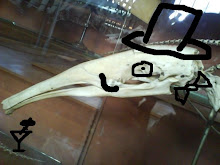Let's see what sciencey pop songs I've missed while I was stuck in a hole writing up.
Kaiser Chiefs - "Love's Not A Competition (but I'm winning)"
Science?: If one takes the rather unromantic and reductionist view that the concept of romantic love is nothing but the complex manifestation of basic mating urges combined with a strong pair bonding instinct, then love is indeed a competition. Many animals compete to win a mate, or to win valuable access to favourable mating grounds. From stag beetles to elephant seals, they're all at it. Zoologists consider the successful males those that have their share of successful copulations with fecund females, resulting in the birth of progeny. Is Ricky Kaiser Chiefs winning? Wikipedia no mention of Ricky Wilson having successfully copulated with a fecund females resulting the birth of progeny. Therefore, this hard boiled Darwinian blog considers him not a winner, but a loser.
What's it like?: When I first heard this I was convinced it was a cover of some 80s tune by Duran Duran or some such (apparently it's not). That should act as all the review you need.
Science?: Pendulums are part of a bit of science known as "Physics". This type of science, considered by many to be a dark art practised by black hearted necromancers, is so obtuse and arcane that no mortal can understand its ways without first going mad. The diagram below showing the key components of a pendulum clearly demonstrates this, as each elements sounds as if it belongs in a piece of gritty social realism theatre about life in a 1960s prison rather than a weight swinging about on a piece of string.










